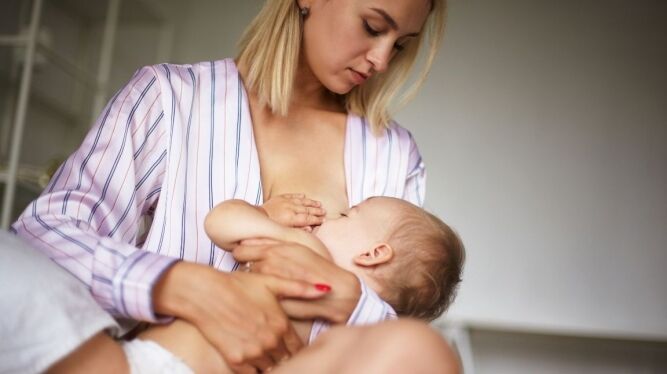In 1992, the World Health Organization and UNICEF launched the global Baby-Friendly Hospital initiative. The Ten Steps to Successful Breastfeeding form the basis of this initiative. Every facility providing parental services and care for newborn infants should be familiar with the practical application of The Ten Steps and the concept of the Baby-Friendly Hospital.
1. HAVE A WRITTEN BREASTFEEDING POLICY THAT IS ROUTINELY COMMUNICATED TO ALL HEALTHCARE STAFF.
Breastfeeding should be organised like any other hospital activity; in maternity wards and all units dedicated to infant care, written rules and instructions have to be prominently displayed, so as to be available to all staff responsible for maternal and infant care.
2. TRAIN ALL HEALTHCARE STAFF IN SKILLS NECESSARY TO IMPLEMENT THIS POLICY.
Healthcare staff education on theoretical and practical aspects of breastfeeding – breastfeeding training – breastfeeding basics
3.INFORM ALL PREGNANT WOMEN ABOUT THE BENEFITS AND MANAGEMENT OF BREASTFEEDING.
Prenatal care units (women’s clinic) should provide c(education of pregnant women) on the importance and benefits of breastfeeding during the first 4 to 6 months, as well as basic breastfeeding skills.
4. HELP MOTHERS INITIATE BREASTFEEDING WITHIN HALF AN HOUR OF BIRTH.
- In the case of vaginal birth, the infant should be placed in skin-to-skin contact with the mother within half an hour of delivery, for at least 30 minutes; hospital staff should help the mother start breastfeeding
- In the case of Caesarean section, the infant should be placed in skin-to-skin contact half an hour after the mother has regained consciousness.
5. SHOW MOTHERS HOW TO BREASTFEED, AND HOW TO MAINTAIN LACTATION EVEN IF THEY SHOULD BE SEPARATED FROM THEIR INFANTS.
Healthcare staff should educate mothers on proper positioning/latching the breast and techniques for expressing breast milk – mothers who are separated from their child due to illness or for other reasons should be educated on expressing breast milk (how to begin and maintain lactation by frequently expressing breast milk)
6. GIVE NEWBORN INFANTS NO FOOD OR DRINK OTHER THAN BREAST MILK, UNLESS MEDICALLY INDICATED.
Breastfed infants should not be given food or drink other than breast milk, unless there are medical reasons to do so.
7. PRACTISE “ROOMING-IN” – THAT IS, ALLOW MOTHERS AND INFANTS TO REMAIN TOGETHER – 24 HOURS A DAY.
All mothers and infants who do not require additional care and attention after the delivery are together 24 hours a day – so-called “rooming-in” – the infant is in a cradle placed at the side of the mother’s bed – with the exception of brief hospital procedures, or if there is a reason for separating the infant from the mother. The term “rooming-in” refers to joint accommodation and care for the mother and infant at the birth clinic. In clinics which practice “rooming-in”, the infant is not separated from the mother after delivery; rather, the two are together at all times, sharing the same room, so the mother can breastfeed when the infant demands it. The aim of “rooming-in” is to establish optimal psychological and physical bonds between the mother, the infant and the whole family, and successfully establish breastfeeding.
8.ENCOURAGE BREASTFEEDING ON DEMAND.
Nothing should interfere with the frequency and duration of breastfeeding sessions – advise mothers to feed their infants whenever they are hungry and for as long as they want, and wake their infants if they have been sleeping for too long or if their breasts are full of milk = breastfeeding on demand (8–10 times/24h).
9. GIVE NO ARTIFICIAL TEATS OR PACIFIERS (DUMMIES) TO BREASTFEEDING INFANTS.
Infants should not be bottle-fed, or given pacifiers (dummies).
10. FOSTER THE ESTABLISHMENT OF BREASTFEEDING SUPPORT GROUPS AND REFER MOTHERS TO THEM ON DISCHARGE FROM THE HOSPITAL OR CLINIC.
Discussing plans for feeding the infant at home – mothers are advised to join breastfeeding support groups (if their families do not provide adequate support) – use counselling and printed materials to refer mothers to breastfeeding support groups in the area, which provide appropriate advice and assistance – breastfeeding support system by monitoring mothers after discharge from the hospital – early postnatal or lactational clinical examination, house calls, phone calls.
Baby-friendly hospital
Based on The Ten Steps to Successful Breastfeeding, UNICEF and WHO developed global criteria which maternity facilities and hospitals must meet in order to merit the designation of Baby-Friendly Hospital. This designation is publicly awarded to maternity facilities which protect, promote and maintain breastfeeding, and provide mothers who wish to breastfeed with the necessary support and conditions to do so.
National and international organisations that take part in promoting breastfeeding:
- UNICEF – Office for Croatia and Slovenia – Savska cesta 41, Zagreb
- Committee for the Coordination of Assistance and Child Health Care – Breastfeeding Working Group – Children’s Hospital, Klaićeva 16, Zagreb
- GIFA (Geneva Infant Feeding Association) – Geneva, Switzerland
- IBFAN (International Baby Food Action Network) – Penang, Malaysia
Download LittleDot – Your Trusted Family Health Partner!
Easily manage your family’s health with our app. Track medical records, consult doctors, and stay one step ahead. Everything you need, right at your fingertips. Download now and try it for free!
